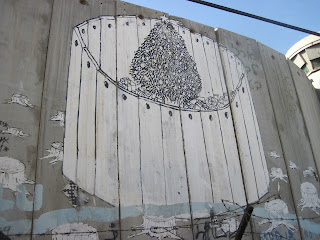Tuesday (October 14) was our first day of olive picking! Read the group blog's account of the day here--photos included, as always.
We set out for the field around 8AM armed with hats, sunscreen, ladders, and tarps (to collect the olives as they fell to the ground).
We worked in the field of a Palestinian farmer named Ali. I was up a ladder picking olives near the top of a tree when I was joined by one of Ali's sons, Ahmad. Ahmad told me about their family--he has six sisters and two brothers. His brothers, Mohamad and Nizar, were also there to help.
The morning was spent tackling the trees in Ali's field. Ali, his sons, and the 45 or so internationals used the 'divide and conquer' method to harvest the olives from all the trees. I tell ya, olive picking is hard work!! Not at all the action of picking itself, but rather the climbing up and down the trees/ladders, the constant sweating, and the hours of exposure to the sun and dust. When it came time for lunch, we had certainly earned our keep.
Ali's wife and family hosted us very hospitably. One image that has stayed with me is Ali drawing bucket after bucket of water from the well and pouring it over each of our hands to wash off the dirt and dust. He and his family were so thankful for all of our work, and when we left them it was with the feeling that we had done something worthwhile.
In spite of our sweatiness/dustiness, we proceeded with the afternoon's plan of a tour of Bethlehem. We visited Aida Refugee Camp, one of three refugee camps in Bethlehem. Aida houses Palestinian refugees from 42 villages that were seized by Israel and are now part of Israel proper. Many of these families still have the keys to their homes.
We also spent some time walking around the inner perimeter of the Separation Wall, which essentially makes Bethlehem an open-air prison. Twenty feet high and an eye sore in anyone's estimation, the wall has become an outlet for people's frustrations, hopes, creativity, and desire for justice and peace. It is covered in graffiti, the work of Palestinians and others. Words cannot do this artwork justice. The pain, hope, and suffering conveyed through it is haunting, beautiful, and to be honest, more profound and evocative (for me) than some of the holy sites we have visited thus far.
We set out for the field around 8AM armed with hats, sunscreen, ladders, and tarps (to collect the olives as they fell to the ground).
We worked in the field of a Palestinian farmer named Ali. I was up a ladder picking olives near the top of a tree when I was joined by one of Ali's sons, Ahmad. Ahmad told me about their family--he has six sisters and two brothers. His brothers, Mohamad and Nizar, were also there to help.
The morning was spent tackling the trees in Ali's field. Ali, his sons, and the 45 or so internationals used the 'divide and conquer' method to harvest the olives from all the trees. I tell ya, olive picking is hard work!! Not at all the action of picking itself, but rather the climbing up and down the trees/ladders, the constant sweating, and the hours of exposure to the sun and dust. When it came time for lunch, we had certainly earned our keep.
Ali's wife and family hosted us very hospitably. One image that has stayed with me is Ali drawing bucket after bucket of water from the well and pouring it over each of our hands to wash off the dirt and dust. He and his family were so thankful for all of our work, and when we left them it was with the feeling that we had done something worthwhile.
In spite of our sweatiness/dustiness, we proceeded with the afternoon's plan of a tour of Bethlehem. We visited Aida Refugee Camp, one of three refugee camps in Bethlehem. Aida houses Palestinian refugees from 42 villages that were seized by Israel and are now part of Israel proper. Many of these families still have the keys to their homes.
We also spent some time walking around the inner perimeter of the Separation Wall, which essentially makes Bethlehem an open-air prison. Twenty feet high and an eye sore in anyone's estimation, the wall has become an outlet for people's frustrations, hopes, creativity, and desire for justice and peace. It is covered in graffiti, the work of Palestinians and others. Words cannot do this artwork justice. The pain, hope, and suffering conveyed through it is haunting, beautiful, and to be honest, more profound and evocative (for me) than some of the holy sites we have visited thus far.
 |
| "We can't live, so we are waiting for death." |




















